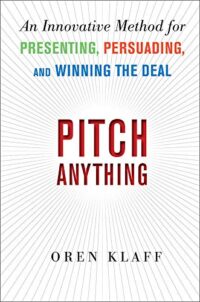
Reading Notes for:
Pitch Anything
By Oren Klaff
An Innovative Method for Presenting, Persuading, and Winning the Deal
Learning to harness and understand the power of frames is the most important thing you will ever learn.
Sales techniques are for people who have already lost the frame control collision and are struggling to function from a lower status position. When you have lost the social frame you have lost the sale. This can be won or lost even before the pitch starts.
You MUST own the frame to win the game
Frames are used to package your power, information, usefulness, and status. Everyone uses frames whether they know it or not. Every social encounter brings frames together. Frames don’t stay in the same time and place for long without crashing into each other and dominate to absorb the others
The winning frame governs a social interaction.
Choosing a Frame
When entering an interaction you must ask: what kind of frame am I up against?
Most frames revolve around basic desires. Activate basic desires.
If I know that person is a hard charging type A, I’m coming in with my power busting frame. If they are an analytical type, I will bring an intrigue frame. If I’m out numbered and out gunned, time frames and prize frames. And be willing to change.
There are 3 main frames you are up against most of the time
- Power Frame: use power busting
- Time Frame: use time constraining
- Analyst Frame: use intrigue
Power Frame: Most common you face. Ego. Esteem rooted in their power. Expect you adopt their frame
- First and most important rule is to not react to it and don’t do anything that strengthens it. Don’t fall into subordination, or being deferential. Avoid meaningless small talk. Don’t allow yourself to be told what to do. Prepare for the form collision to happen.
- Author had guy drawing his hand on the back of proposal. Stopped and said “wow, this is really good. How much do you want for it?” and started a bidding war.
- Lose over something trivial if you have to lose.
- Taking the frame: 1. perpetrate a small denial or 2. act out some sort of defiance.
- Put folder on table and when they try to grab say “nope. Not yet.”
- Let them see it a little bit, then “nope, not until I say you are ready.”
- A Small but forceful act of defiance. “I only have 15 minutes today.” You: “Great, I only have 12.”
- Be defiant and funny, not rude or angry. Nobody likes to lose the frame, so keep it fun.
Prize Frame: This is good when the key decision maker doesn’t attend. Need to reframe using a power, time, or prize frame to take the meeting back. Nobody can tell your story the way you can, so you can’t trust them to pass it on.
- So, you are asking me delay the start? Ok, I can give you 15 minutes to get yourselves organized but, if we can’t start by then, then we should probably just call it a day.
- If they say “let’s get started and we will relay it to Mr. Big.” Don’t let your frame get absorbed by that. Say no. The meeting needs to start when you say it starts and follow your agenda, not theirs. So, “Ok, I can wait 15 minutes then I have to leave.” Your heart will race and you will freak out. But then it will work. If not, pack your stuff and leave. And tell the most influential person in the room that you are willing to reschedule, but only on your turf. This is known as Prizing.
- Prizing: subtle framing technique where you reframe everything your audience does or says as if they are trying to win you over. You are trying to win my attention. I am the prize, not you. And if they want to get anything else from you – information or meeting – they have to do something first. Make the buyer qualify themselves to you.
- Tell me a little about yourselves. I’m picky about who I do business with. Why do I want to do business with you?
- Rotates circle of power 180 degrees.
